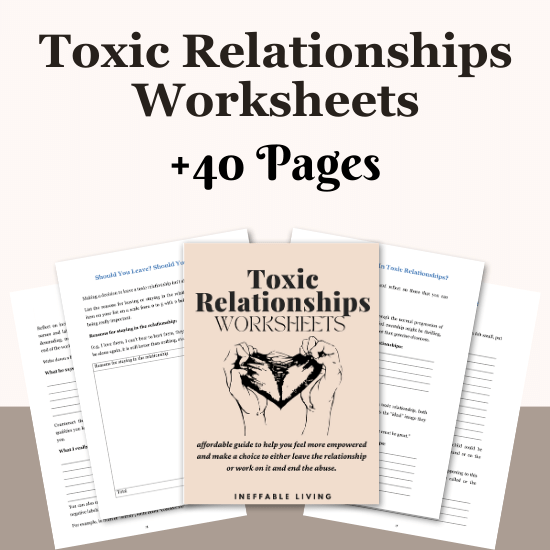This post contains signs of a toxic person as well as helpful tips on how to deal with them.
7 Signs of a Toxic Person
Here are seven common signs of a toxic person:
1. Lack of Empathy
Toxic individuals often display a consistent lack of empathy towards others.
They may dismiss or minimize others’ emotions, prioritize their own needs without regard for others’ feelings, and demonstrate a pattern of callousness or indifference towards the experiences of those around them.
2. Manipulative Behavior
Manipulation is a hallmark trait of toxic individuals.
They may employ tactics such as guilt-tripping, gaslighting, or exploiting others’ vulnerabilities to exert control or gain advantage in relationships.
Manipulative individuals often use charm and charisma to influence others, while concealing their underlying motives for personal gain.
3. Constant Criticism and Disparagement
Toxic individuals frequently engage in belittling or disparaging behavior towards others.
They may habitually criticize, ridicule, or undermine those around them, contributing to a pervasive atmosphere of negativity and self-doubt within their social circles.
Related: Best 40 Journal Prompts For Toxic Relationships
4. Boundary Violation
A lack of respect for boundaries is a defining feature of toxic individuals.
They may disregard others’ personal space, emotional limits, and consent, imposing their will or intruding into others’ lives without regard for individual autonomy or well-being.
5. Constant Drama and Conflict
Toxic individuals often thrive on drama and conflict, perpetuating a cycle of tension and instability in their relationships.
They may instigate or escalate interpersonal conflicts, create divisive social dynamics, and perpetuate an atmosphere of chaos and discord.
6. Narcissistic Traits
Narcissistic tendencies, such as grandiosity, entitlement, and a relentless need for admiration, are commonly observed in toxic individuals.
They may exhibit an inflated sense of self-importance, demonstrate a lack of accountability for their actions, and demand unwavering validation and attention from others.
7. Isolation of Others
Toxic individuals may engage in behaviors aimed at isolating others from their support networks or undermining their social connections.
This could involve spreading rumors, sowing discord between individuals, or coercively exerting influence to isolate and control those around them.
Related: Finding Peace After A Toxic Relationship In 5 Steps
How to Deal With a Toxic Person?
Dealing with a toxic person can be challenging and emotionally draining. Here are some tips for dealing with a toxic person:
1. Recognize the Signs
Toxic people often exhibit manipulative or controlling behavior, consistently create drama or conflict, and drain your energy and emotional resources.
2. Set Boundaries
Establish clear boundaries with the toxic person.
Communicate your limits and stick to them, even if it means reducing contact or ending the relationship.
3. Practice Self-Care
Engage in self-care activities that recharge you and promote emotional well-being.
This may include exercise, meditation, spending time with supportive friends, or seeking professional help from a therapist.
4. Develop Emotional Awareness
Understand how the toxic person affects your emotions and mental health.
Recognize when their behavior triggers negative feelings and develop coping strategies to manage these emotions.
Related: Top 8 Tips on Letting Go of Toxic People
5. Seek Support
Surround yourself with a support network of friends, family, or a therapist who can provide guidance, validation, and perspective on the situation.
6. Communicate Effectively
When interacting with the toxic person, use assertive communication to express your feelings and needs while maintaining respect and setting boundaries.
7. Focus on Solutions
Instead of getting drawn into the toxic person’s drama, focus on finding solutions and positive outcomes in your interactions with them.
8. Let Go of Guilt
Understand that it’s okay to prioritize your own well-being and set boundaries with toxic individuals.
Let go of any guilt associated with protecting yourself from their negative influence.
9. Reflect on Patterns
Take time to reflect on any patterns or dynamics in your relationships that may be contributing to interactions with toxic individuals.
Understanding these patterns can help you make healthier choices in the future.
10. Consider Distance
In some cases, creating physical or emotional distance from the toxic person may be necessary for your well-being.
This could involve limiting contact, ending the relationship, or seeking alternative living arrangements.
Related: How Does a Narcissist React to Being Blocked? Top 10 Reactions

Conclusion
When confronted with toxic individuals, it is essential to prioritize one’s mental and emotional well-being.
By adopting proactive coping strategies, setting and maintaining healthy boundaries, and seeking support from trusted sources, individuals can safeguard their well-being and navigate interactions with toxic individuals with greater resilience and self-advocacy.



